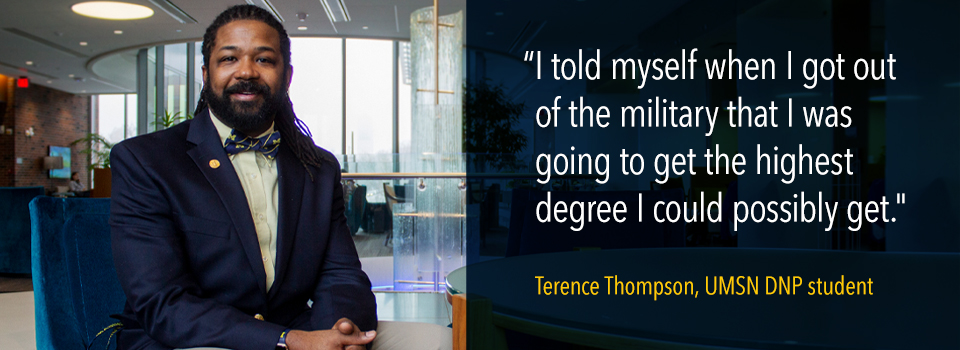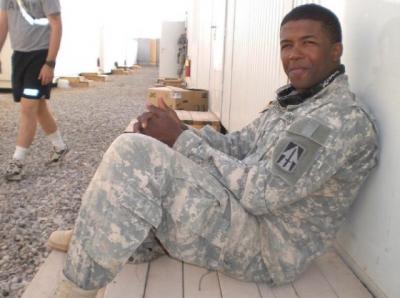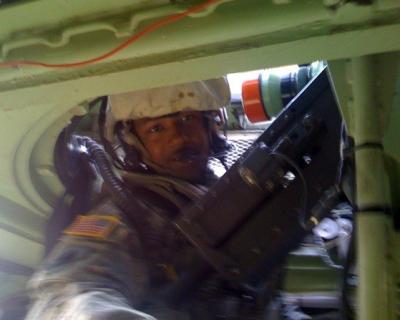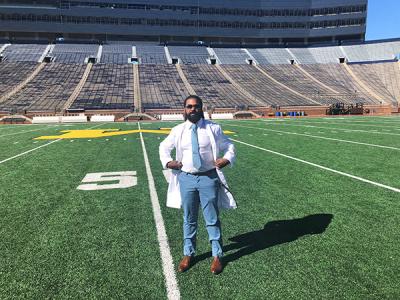Student spotlight: Veteran’s promise about to be fulfilled

Terence Thompson made a bold choice when he was 17 years old. He got a special waiver so he could join the military as a minor and he became an Army medic. It was the quickest path to getting the hands-on medical training he wanted.
Now a University of Michigan School of Nursing (UMSN) Doctor of Nursing Practice (DNP) student, Thompson spent 12 years in the military including a 2008 deployment to Iraq where he put his training to work in a war zone.
Deployment
 “I was a medic for convoy security,” he said. “We would help move contractors from one place to another in a big convoy. It was one of the most dangerous jobs in Iraq. Our military trucks would be in the front, middle and back so that we could prevent the supplies from being taken or blown up by bombs planted at the side of the road. I would say we found one or got hit with one every week or two.”
“I was a medic for convoy security,” he said. “We would help move contractors from one place to another in a big convoy. It was one of the most dangerous jobs in Iraq. Our military trucks would be in the front, middle and back so that we could prevent the supplies from being taken or blown up by bombs planted at the side of the road. I would say we found one or got hit with one every week or two.”
Thompson’s main duty was to help the wounded.
“The military trucks had armor so our soldiers were somewhat protected but they got a lot of concussions,” said Thompson. “A lot of the civilian trucks didn’t have armor, so if they got hit with an explosion they got hurt pretty bad.”
To help the wounded meant Thompson had to leave the safety of his armored vehicle.
“I was scared a lot to be honest, especially if we got hit by an explosion while we were in a city,” he said. “There could be people up in those buildings who intentionally blew us up to shoot us when we got out of the truck. That was pretty nerve-wracking.”
Thompson’s military experience also gave him valuable lessons in seeing people for who they are.
“I spent a lot of time with the Iraqi interpreters because they usually rode in the back of the truck with me,” said Thompson. “Some people really tried to make the Iraqis seem like villains but they weren’t. These people would risk their lives and sometimes their entire families would be killed because they helped us.”
 While Thompson found military service to be rewarding, he was having trouble in one area. The lack of a high school diploma was a disadvantage when he tried to advance his military career.
While Thompson found military service to be rewarding, he was having trouble in one area. The lack of a high school diploma was a disadvantage when he tried to advance his military career.
“It was hard for me to gain rank,” he said. “I was basically in 9th grade, credit wise, when I dropped out of high school. I told myself when I got out of the military that I was going to get the highest degree I could possibly get.”
A promise kept
After six years in the Army and six years in the National Guard, Thompson decided it was time to focus on his education. He knew it would take a lot of effort, especially while he and his wife are raising four children, ages 19 months to 14 years old, but he was determined.
“I had to do extra classes before I could even start college,” he said.
Thompson earned a BSN in his home state of Indiana and quickly found his focus area in cardiac intensive care units (ICUs).
“When you can take someone who was basically not alive and see them walk out of the hospital, that’s the best,” he said. “I also really like when you see someone come back months later to show you that they’re doing good.”
The intensity and high stakes of cardiac care fit well with Thompson’s experience.
“I like the excitement of cardiac ICUs,” he said. “People always ask me, ‘Why do you never seem like you are panicking?’ Code situations don’t really bother me. I think I’m generally a calm person but nothing in the ICU is as bad as over there [in Iraq].”
The DNP
 After gaining on-the-job experience, Thompson enrolled in UMSN’s Adult-Gerontology Acute Care Primary Nurse Practitioner DNP program. He’s now only a few months away from fulfilling his promise to himself. He’s working on his capstone DNP scholarly project which includes serving on a committee that’s shaping the Michigan’s Physician Orders for Scope of Treatment (MI-POST) form which provides information on a person’s wishes at the end of life.
After gaining on-the-job experience, Thompson enrolled in UMSN’s Adult-Gerontology Acute Care Primary Nurse Practitioner DNP program. He’s now only a few months away from fulfilling his promise to himself. He’s working on his capstone DNP scholarly project which includes serving on a committee that’s shaping the Michigan’s Physician Orders for Scope of Treatment (MI-POST) form which provides information on a person’s wishes at the end of life.
“It’s an advanced directive form that’s going to come out this year,” explained Thompson. “It’s directed toward patients who are suspected to have less than a year to live. Another part of my project is to educate providers on the lack of advanced care directives in this country, especially among ethnic minority groups.”
After graduation, Thompson and his family plan to head back to Indiana. However, nursing school will not be over for them because his wife intends to enroll in a nursing school once they get settled.
“Nursing is a really good career choice,” said Thompson. “You know you’re going to get a job and there are countless career paths.”





